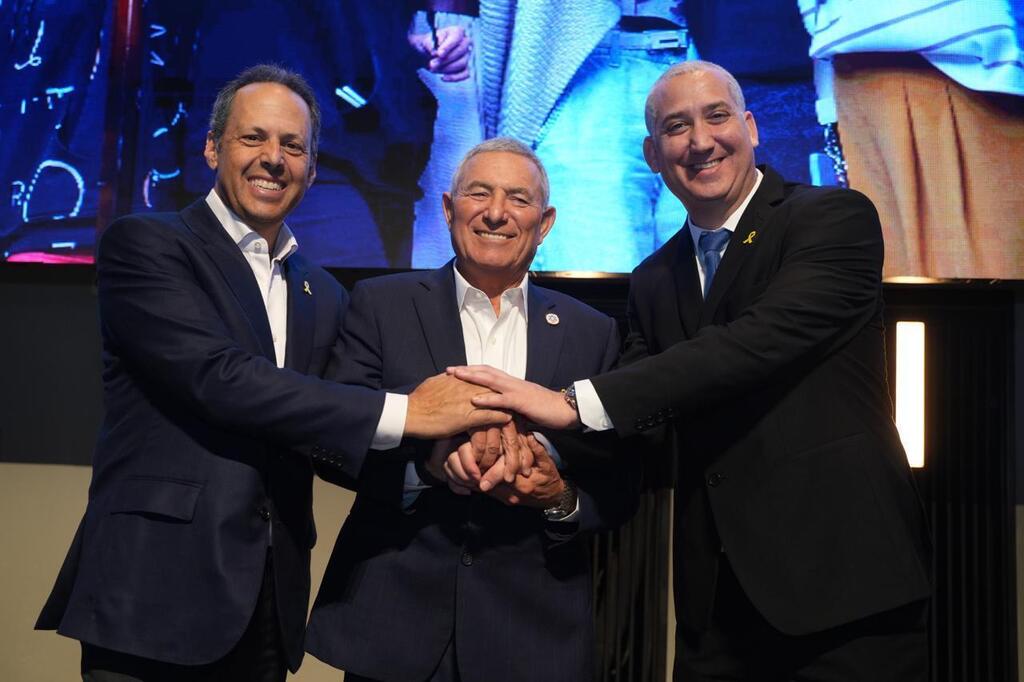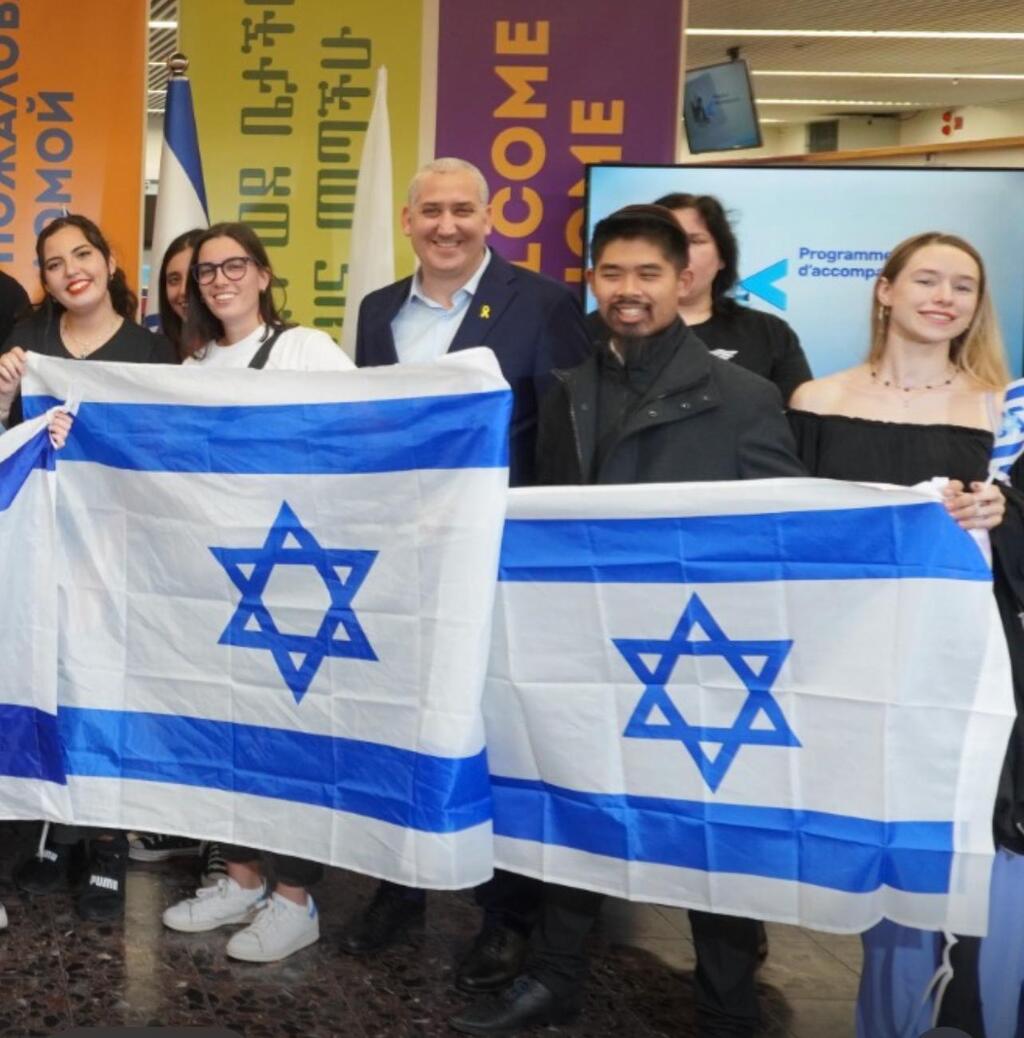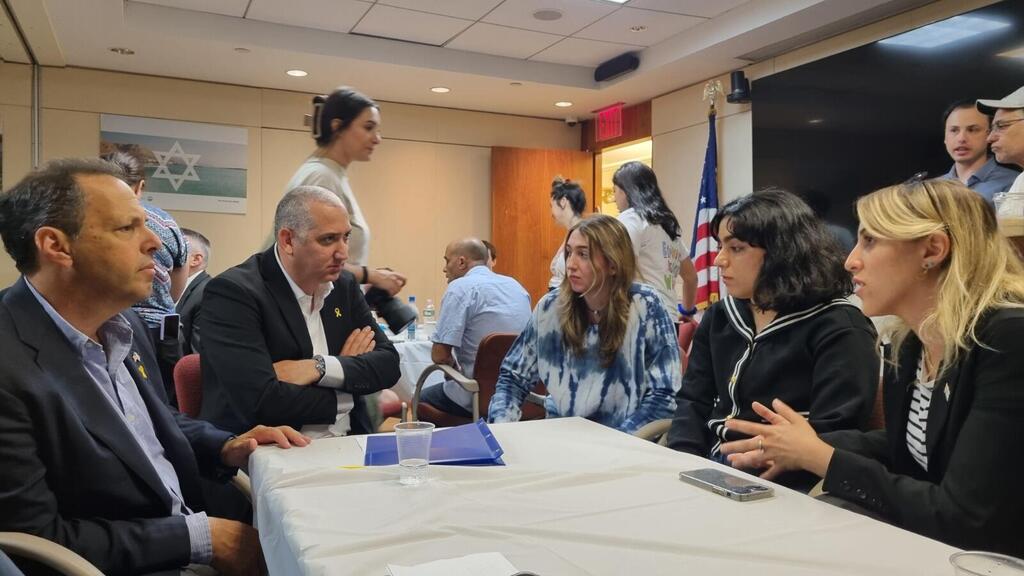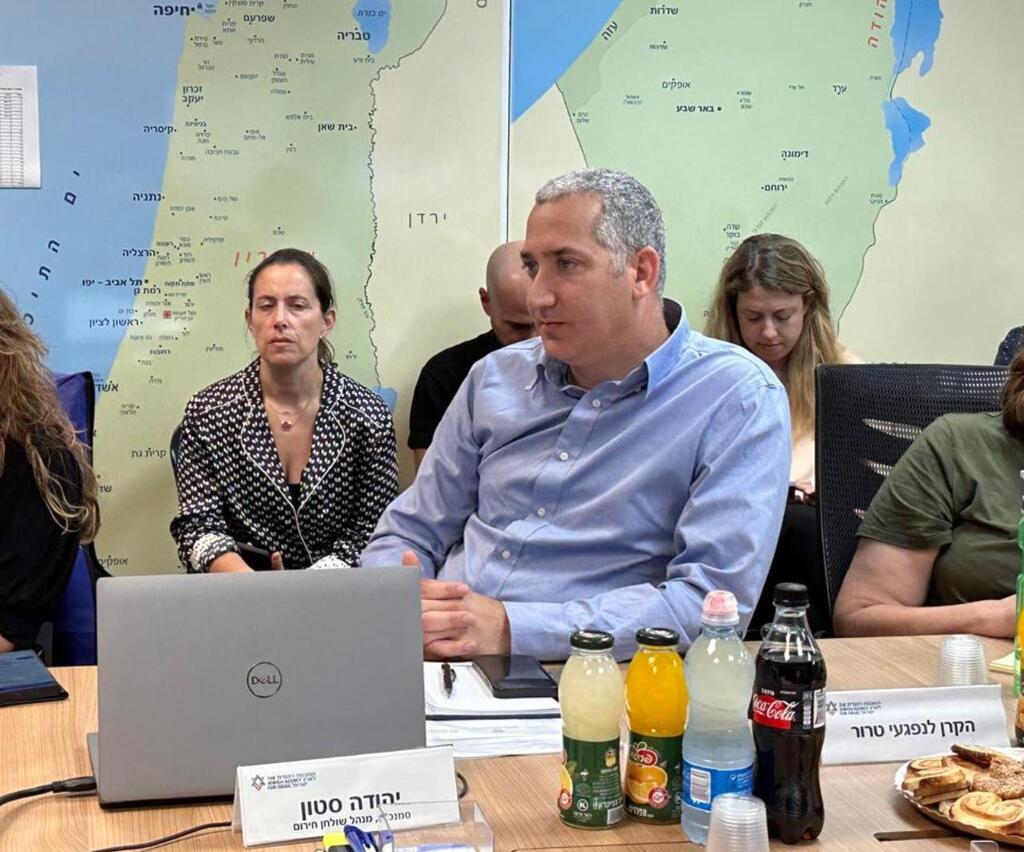"Countries prepare for war, but no country prepares for the process of healing. We have a central role in the healing process that the state needs to undergo—by creating hope," says Jewish Agency CEO Yehuda Setton, 42, as Israel recovers from the worst disaster in Israel’s history.
For 95 years, The Jewish Agency has been dedicated to ensuring the survival and prosperity of the state, and this year, its critical mission has been more vital than ever. As the largest global Jewish organization, The Jewish Agency harnesses the collective strength of the Jewish people to address challenges in Israel and the Diaspora, representing the diverse tapestry of the Jewish people.
4 View gallery


Mark Wilf, chairman of the Board of Governors of The Jewish Agency; Doron Almog, chairman of The Jewish Agency Executive; and Yehuda Setton, CEO and director-general of The Jewish Agency
(Photo: Lior Daskal)
"Our role is to find ways for every Jew around the world to take part in the collective creation called the State of Israel," Setton added. "We focus on harnessing the incredible strength of global Jewry. There’s no politics here—only ideology, and space for everyone to proudly express their Judaism."
The events of October 7 brought a new reality to Jewish communities worldwide, which are now grappling with a surge in antisemitism. "The Jewish people are facing two fronts: the State of Israel, with its many internal challenges, and the dramatic rise in anti-Jewish incidents, which have increased by hundreds of percent," Setton explained.
What happened at The Jewish Agency on October 7? How did you react as the reports started coming in?
"The Jewish Agency operates a situation room that is always active, providing support to Jews in Israel and worldwide. On that Saturday, by 9:00 a.m., the situation room had convened. The first mission was to evacuate The Jewish Agency's absorption center in Ibim, just 3 kilometers from the border. Young Olim at the center held defensive positions until a convoy of buses arrived on Sunday morning to evacuate them safely out of the danger zone."
"As the last bus was boarding, we received reports of a terrorist cell near the village, and we had to get everyone off the bus. You can imagine the tension during those minutes and hours," Setton recounted, adding that The Jewish Agency also assisted in evacuating Masa program participants who were at the Nova festival.
The Jewish Agency realized it needed to mobilize all its resources. Within 48 hours, it reached every affected community in Israel, providing an initial 4,000-shekel grant to terror victims—thanks to global partners, including the Jewish Federations of North America and Keren Hayesod-United Israel Appeal. A large-scale operation was launched to collect information about victims, coordinate with various organizations and reach every impacted family to offer support.
Looking beyond Israel’s borders, what happened to the connection between Israel and the Jewish Diaspora on October 7?
"When the war broke out on October 7, a war also began against the Jewish people. That is the reality. We see this in the massive spike in antisemitic incidents and the declining sense of security among Jews worldwide. On university campuses, for example, as early as October 8—before the scale of the massacre was fully understood—students were already pushing for anti-Israel resolutions," Setton noted.
Over the past year, The Jewish Agency has observed a rise in inquiries from Jews worldwide seeking to help. "Many Jews around the world want to get involved," he shared. "They’re coming to community centers and synagogues, knocking on doors, seeking connections to Israel, and sharing their voices on social media. The mobilization of the Jewish people has been incredible—many have traveled to Israel since the early days of the war, and it’s a huge moment. However, others are scared. In some places, Jews are taking down mezuzahs out of fear. Some are avoiding wearing kippot in public, and some have shared that they feel safer in Israel."
In today’s complex global reality, The Jewish Agency plays a critical role. "Our Security Assistance Fund invested over 19 million shekels this past year in protection in dozens of countries worldwide. We even received an unusual request from the Canadian Jewish community to help secure Jewish institutions—a type of request we’re not used to seeing," shared Setton. "In France, for instance, there has been a surge in Aliyah applications. We haven’t seen such a dramatic shift in years. The nature of inquiries changes throughout the year based on the intensity on the ground, but the trend of young Jews wanting to come to Israel, young Aliyah, continues to grow."
‘We aim to double the number of our shlichim so there isn’t a Jewish community from which we’re absent’
The Jewish Agency has mobilized its 2,300 shlichim (emissaries) around the world, emphasizing the urgent nature of their mission. "We explained to them that their role is critical. We realized that Israel would be isolated and we need them to rally the Jewish world to support us. These shlichim have organized hundreds of rallies and educational activities around the globe."
One of the most heartbreaking stories is that of Lior Zisser, currently in her third year as a Jewish Agency emissary in the U.S. Lior had organized a large rally in support of Israel when, the night before the event, she received devastating news: her brother, Major Ilay Zisser, had fallen in the war.
Get the Ynetnews app on your smartphone: Google Play: https://bit.ly/4eJ37pE | Apple App Store: https://bit.ly/3ZL7iNv
In that moment, she made a powerful decision to stay, deliver her speech at the rally, and only then return to Israel for the funeral. "The strength of these shlichim, standing proud in their Jewish identity and saying, ‘We are here, and we’re not going anywhere,’ is incredible," said Setton with pride. "Today, we are present in 274 communities worldwide, strengthening the connection to Israel and Jewish identity, and we plan to double that reach. We want to ensure there isn’t a Jewish community from which we’re absent, that they feel a part of Israel."
Turning his focus to Israel’s internal challenges, Setton emphasized the importance of rebuilding and looking forward. "I believe The Jewish Agency has a central role in the healing process that the country must undergo. This is primarily about creating hope. Many leaders talk about hope, but the responsibility lies in delivering it, in showing people they are not alone. Resilience comes from the knowledge that we know we’re not alone."
Setton stressed that the state must not abandon its role. "We can help restore trust among those who have been harmed, and we do this together with the state—not in its place. Since the war began, we’ve supported more than 8,000 small business owners in the north and south through grants, emergency loans and mentorship. We’ve connected Jewish communities worldwide to those affected in Israel, always asking ourselves—how can we continue to help them in 2025?"
4 View gallery


Setton welcomes new Olim from France at Ben Gurion Airport
(Photo: The Jewish Agency)
"My condition for partnerships between Jewish communities abroad and communities in Israel’s south was that the support be guaranteed for at least the next three years," he explained. This understanding of the long-term rebuilding process is critical, he said, to offering meaningful and sustainable solutions to communities affected by the war.
Alongside these efforts, Setton emphasizes that one of Israel’s greatest engines for growth lies in Aliyah. "Our goal is to bring 300,000 Olim and connect them to young communities in the north and south, transforming these areas into vibrant hubs," he explained. "Additionally, we are planning a rural expansion project to build the next homes and units, bringing in resources and ensuring we are there for the future."
Another critical area of support is for the families of hostages. From the outset, The Jewish Agency used its infrastructure, working with the Hostages and Missing Families Forum to connect families with Jewish communities worldwide for advocacy and support. "This has been an essential initiative that continues to this day because, unfortunately, our brothers and sisters are still there," Setton said.
Setton’s numerous heartwarming stories highlight silver linings during this challenging year. One particularly moving message came from a mother from the north whose child participated in The Jewish Agency’s “Campers2Gether” initiative, in collaboration with Mosaic United. The program sent 1,000 teens from Israel’s north and south to summer and winter camps hosted by Jewish communities in the U.S. and worldwide.
The mother wrote: "There were children from the north who were forgotten throughout the war. Schools fell apart, and friends disappeared. You were their beacon of light." Reflecting on the message, Setton added, "If we were able to give even one child that sense of belonging, then we’ve fulfilled our mission."
What goals does The Jewish Agency set for the coming years, and how do you view Aliyah as a means of rebuilding Israel?
"We must recognize that there are difficult years ahead, but around the world, there are people who will not abandon us. The Jewish Agency will continue to be here to help the State of Israel. For me, the overarching goals are, first, enabling every Jew worldwide to take an active part in building the State of Israel. Second, we need to expand the global Jewish network by fostering pride and connection to Israel, ensuring every Jew around the world feels secure.
“In the next five years, hundreds of thousands of Olim will arrive, either for the long-term or transitional periods. This will boost the economy and project resilience. Within Israel, we need to create anchor projects that inspire hope, such as our Youth Futures program, the Fund for Victims of Terror, rural expansion initiatives and support for small businesses. Each of these is a large-scale project.
“Additionally, we must ensure that Jewish communities around the world lacking resources are provided with sustainable mechanisms to feel secure and supported."
Eight candles, eight highlights from The Jewish Agency's work over the past year—what stands out?
"There are so many," says Setton with a smile, as he elaborates: "Welcoming 35,000 new Olim from nearly 100 countries despite the war; providing over NIS 350 million in grants and loans to more than 8,000 businesses and reservists; adding 26 new partnerships to our existing network, connecting communities impacted in Israel with Jewish communities worldwide, ensuring ongoing support; mobilizing 2,300 shlichim globally to advocate for Israel, raise awareness about the hostages, and strengthen resilience in the face of antisemitism; deploying over 100 emissaries on university campuses—a critical front in combating antisemitism and supporting Jewish students.
“Investing NIS 19 million through our Security Assistance Fund across 62 countries with grants; expanding the 'Youth Futures' initiative to every city in northern and southern Israel affected by the war, and we’ll continue to support them in the coming years. We took soldiers out of their service and called them 'Shlichim in Uniform.' They traveled to Jewish communities around the world to share their stories. And finally, the employees, staff and leaders of The Jewish Agency who leave their families and risk their lives to be there for those who need us most—this is a mission like no other."
If you too would like to share small blessings for the Jewish people in Israel and around the world in the coming year, visit The Jewish Agency’s digital menorah. Light a candle, leave a message of hope, and join us in spreading light and Jewish unity worldwide.
In collaboration with The Jewish Agency.



